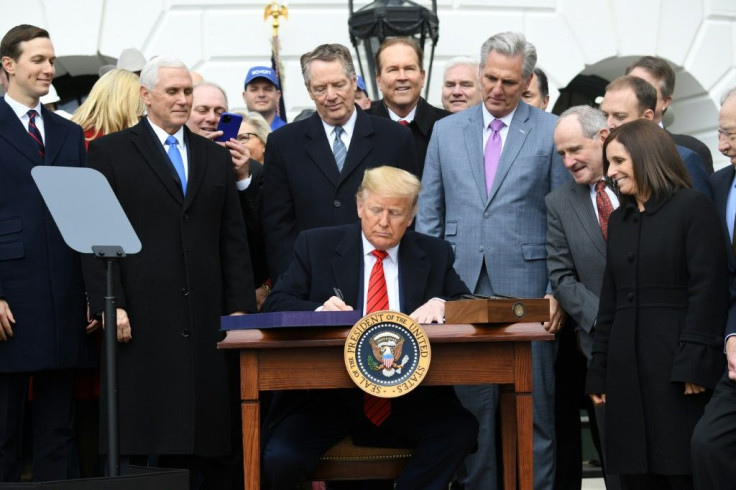President Trump Signs Emergency Coronavirus Spending Bill

KEY POINTS
- The bill sailed through Congress in about 24 hours and received near unanimous consent
- The bulk of the money will got to state and local officials as well as into medical research for treatments and a vaccine
- The signing came as the number of U.S. cases rose above 200
President Trump Friday signed an $8.3 billion emergency spending bill to fight the coronavirus outbreak. The bill sped through Congress this week as the number of U.S. cases topped 230.
The bill provides $3.1 billion for research for treatments and a vaccine.
Judd Deere, special assistant to the president, announced the signing on Twitter.
🚨🚨@realDonaldTrump just signed the Coronavirus Supplemental funding bill before departing the @WhiteHouse for Tennessee. The funding, which the president requested, will accelerate development of a vaccine and assist with response efforts. 🖊 pic.twitter.com/iV9jzncbxT
— Judd Deere 45 Archived (@JuddPDeere45) March 6, 2020
“It’s an unforeseen problem. ... It came out of nowhere but we're taking care of it,” Trump said as he signed the measure. The president has been trying to downplay the threat in a bid to calm the markets, which have gyrated wildly this week after losing more than 12% last week. The Dow Jones Industrial Average opened more than 750 points lower on Friday.
The bill more than triples the funding request Trump submitted to Congress. Lawmakers said the White House request was inadequate given the rapid spread and severe nature of the virus, which causes a lung disease dubbed COVID-19. At least a dozen Americans have died from the infection, which first surfaced in China and has since sickened more than 100,000 worldwide, causing more than 3,400 deaths.
The bill sailed through the Senate 96-1 after clearing the House 415-2 in little over 24 hours after the text was released.
The administration has been criticized for its slow reaction to the outbreak and mistakes at the outset, including the alleged failure to provide protective gear to health workers who were on hand when the first evacuated Americans arrived from China.
The bill provides $6.5 billion to the Department of Health and Human Services, including $1 billion to be disbursed to states, cities and tribes in the next month for local response. Each state gets at least $4 million. Lawmakers ordered HHS to spend $3.1 billion on medical supplies, vaccine research and shoring up U.S. health systems to handle the onslaught of cases.
Sen. Lamar Alexander, R-Tenn., noted the responsibility for fighting the outbreak will fall on state and local officials.
"We have our oversight responsibilities, but we have to rely on our governors and state and local public health systems," Alexander, who chairs one of the Senate’s spending subcommittees, told reporters Thursday. "So, we have to have confidence in them, because they’re closer to the problem.”
The State Department will receive nearly $1.3 billion for evacuations and supporting global health programs while the Small Business Administration will receive $20 million for loans to businesses affected by the virus. The bill also provides $500 million in waivers for Medicare telehealth restrictions.
The White House initially asked for only $2.5 billion, little more than half of it designated as new spending with the rest coming from existing programs. The bill requires the administration the put back the $136 million it diverted from research to help people with substance abuse problems and from programs subsidizing energy bills for the poor.
The bill narrowly defines how the money can be spent, and Congress plans to keep a close watch on the purse strings.
“It can’t just be used to pad coffers should this not turn out to be what we thought it was going to be,” a Republican Senate aide told reporters.
The bill does not allow the money to be used for anything besides fighting coronavirus and other infectious diseases.
© Copyright IBTimes 2024. All rights reserved.






















